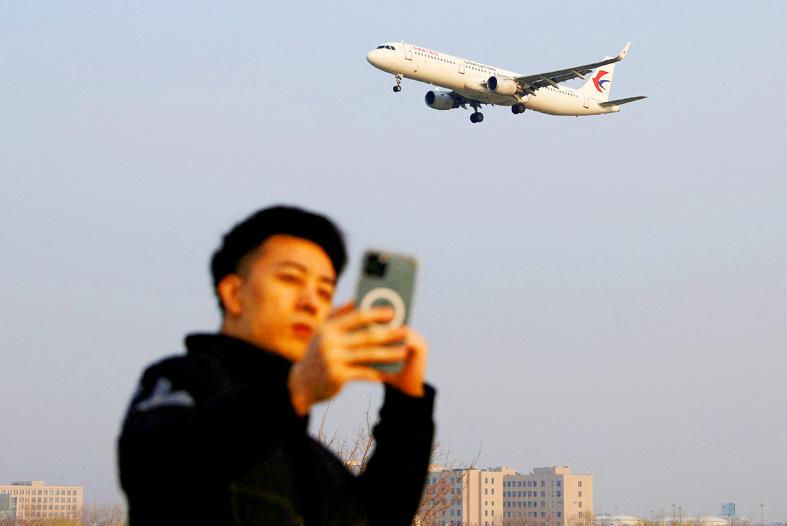China Eastern Airlines Corp (中國東方航空) has resumed flights using the same type of plane that recently crashed in southern China, a sign that it is working toward putting the entire fleet back in the air.
A 737-800 jet flew from Kunming to Chengdu on Sunday, according to flightradar24.com.
Other planes of the same model made by Boeing Co have been used in what appeared to be test flights, including near Shanghai.

Photo: Reuters
Xinhua news agency yesterday reported that the airline has returned the 737-800 to commercial service, without saying how it got the information.
Planes with similar registration numbers to the one that went down on March 21 killing all 132 people on board were still being evaluated, it said.
China Eastern grounded more than 200 of the Boeing 737-800 planes after the crash in Wuzhou, in the Guangxi region. Flight 5735 from Kunming to Guangzhou was cruising at about 8,840m when it suddenly dove, slamming into a forested hillside about 160km from its destination.
Investigators retrieved the two “black boxes” from the crash site — one that recorded voices in the cockpit and another that captured flight data — and sent them to the US. The hope is that information on the devices will help solve the mystery of what happened to the jet, which disintegrated into tens of thousands of pieces on impact.
A preliminary report is to be produced this week, as required by UN standards governing the aviation industry, and a full report is expected within 12 months.

In Italy’s storied gold-making hubs, jewelers are reworking their designs to trim gold content as they race to blunt the effect of record prices and appeal to shoppers watching their budgets. Gold prices hit a record high on Thursday, surging near US$5,600 an ounce, more than double a year ago as geopolitical concerns and jitters over trade pushed investors toward the safe-haven asset. The rally is putting undue pressure on small artisans as they face mounting demands from customers, including international brands, to produce cheaper items, from signature pieces to wedding rings, according to interviews with four independent jewelers in Italy’s main

Macronix International Co (旺宏), the world’s biggest NOR flash memory supplier, yesterday said it would spend NT$22 billion (US$699.1 million) on capacity expansion this year to increase its production of mid-to-low-density memory chips as the world’s major memorychip suppliers are phasing out the market. The company said its planned capital expenditures are about 11 times higher than the NT$1.8 billion it spent on new facilities and equipment last year. A majority of this year’s outlay would be allocated to step up capacity of multi-level cell (MLC) NAND flash memory chips, which are used in embedded multimedia cards (eMMC), a managed

Japanese Prime Minister Sanae Takaichi has talked up the benefits of a weaker yen in a campaign speech, adopting a tone at odds with her finance ministry, which has refused to rule out any options to counter excessive foreign exchange volatility. Takaichi later softened her stance, saying she did not have a preference for the yen’s direction. “People say the weak yen is bad right now, but for export industries, it’s a major opportunity,” Takaichi said on Saturday at a rally for Liberal Democratic Party candidate Daishiro Yamagiwa in Kanagawa Prefecture ahead of a snap election on Sunday. “Whether it’s selling food or

In the wake of strong global demand for AI applications, Taiwan’s export-oriented economy accelerated with the composite index of economic indicators flashing the first “red” light in December for one year, indicating the economy is in booming mode, the National Development Council (NDC) said yesterday. Moreover, the index of leading indicators, which gauges the potential state of the economy over the next six months, also moved higher in December amid growing optimism over the outlook, the NDC said. In December, the index of economic indicators rose one point from a month earlier to 38, at the lower end of the “red” light.